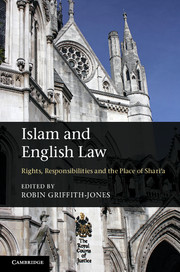Book contents
- Frontmatter
- Contents
- List of contributors
- List of abbreviations
- Preface
- Introduction
- Part I The Archbishop of Canterbury and shariʽa law
- Part II The Archbishop’s proposal for ‘transformative accommodation’
- Shariʽa and secular democracy: is Islamic law compatible with the European Convention on Human Rights?
- Legal pluralism: should English law give greater recognition to Islamic law?
- 7 Family law: current conflicts and their resolution
- 8 Islamic finance, alternative dispute resolution and family law: developments towards legal pluralism?
- 9 Judging Muslims
- 10 From Muslim migrants to Muslim citizens
- 11 Ontario’s ‘shariʽa court’: law and politics intertwined
- Accommodation or conflict: trajectories in the United Kingdom
- Part III Responsibilities and rights
- Part IV Prospect: equality before God and before the law
- Select bibliography
- Index of cases
- Index
- References
9 - Judging Muslims
Published online by Cambridge University Press: 05 April 2013
- Frontmatter
- Contents
- List of contributors
- List of abbreviations
- Preface
- Introduction
- Part I The Archbishop of Canterbury and shariʽa law
- Part II The Archbishop’s proposal for ‘transformative accommodation’
- Shariʽa and secular democracy: is Islamic law compatible with the European Convention on Human Rights?
- Legal pluralism: should English law give greater recognition to Islamic law?
- 7 Family law: current conflicts and their resolution
- 8 Islamic finance, alternative dispute resolution and family law: developments towards legal pluralism?
- 9 Judging Muslims
- 10 From Muslim migrants to Muslim citizens
- 11 Ontario’s ‘shariʽa court’: law and politics intertwined
- Accommodation or conflict: trajectories in the United Kingdom
- Part III Responsibilities and rights
- Part IV Prospect: equality before God and before the law
- Select bibliography
- Index of cases
- Index
- References
Summary
The current discussion of Muslim law and its relevance for British jurisdictions has largely bypassed the activity of the official courts. Whatever accommodation may or may not be given to Muslim law within British legal systems, judges in British courts and tribunals will need to ensure that greater attention is paid to the religion and mores of Muslim communities. Indeed, there is already evidence that British judges have had to reckon, and increasingly so, with issues of cultural specificity and expertise when cases involving Muslims come before them. In this chapter, I outline some of the tensions between legal traditions in such cases. The focus is on issues of marriage and divorce, and the argument centres on the need for a greater flexibility in judicial decision-making when Muslim cases come before courts.
The moral deficiency of those who subscribe to non-Christian religions is a well-established – and still endemic – theme in Western culture. Those who follow ‘false religions’ are morally suspect and, since it is assumed that action follows doctrine, their actions bear out the falsity of their doctrines. Modern secularism, although it purports to transcend the bias of particular religions, has not abandoned this theme, and it survives and reproduces through other, ostensibly non-religious, secular tests. The underlying theme is clear and evident in the ways in which Western legal orders are responding to the presence of Muslims. Muslims, for their part, have not been able to formulate coherent responses to societal or legal pluralism, and generally assume that others should accept the centrality of their Islamic doctrines. It may therefore be argued that neither the West nor its Muslims are fully prepared to respond to the globalisation, migration and pluralism of contemporary times. Instead, each side manoeuvres with the aim of asserting the moral superiority of its own doctrines. This chapter takes these blockages to pluralist thinking as givens, and assumes that there is nonetheless a willingness to overcome them.
- Type
- Chapter
- Information
- Islam and English LawRights, Responsibilities and the Place of Shari'a, pp. 144 - 156Publisher: Cambridge University PressPrint publication year: 2013
References
- 5
- Cited by

